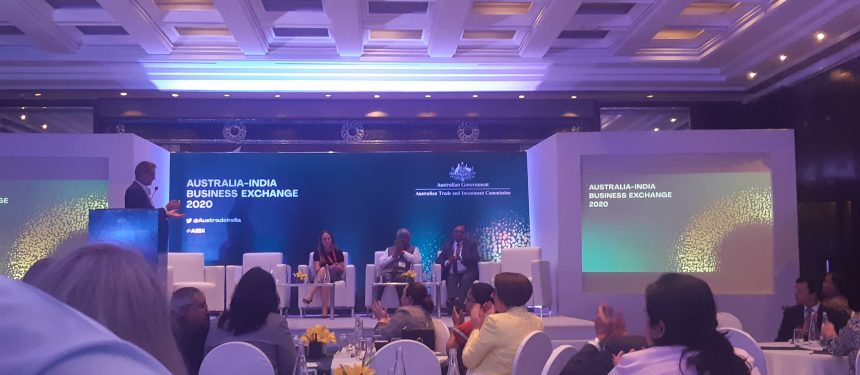An Australian higher education delegation is exploring opportunities to foster ties with Indian HEIs as part of the Australia-India Business Exchange 2020 (AIB-X). One of the aims of the visit is to deliver the message that despite recent challenges such as bushfires, Australia continues to be a great place to visit and study.
News and business analysis for Professionals in International Education
Have some pie!
Aus delegation explores p’ships with India
 Photo: AIB-X
Photo: AIB-X Lead by Australian minister for trade, tourism and investment, Simon Birmingham, the team comprising 31 academics from leading Australian universities and the country’s trade commissioner and government officials, also participated in a conference entitled ‘Building better partnerships to reinforce world-class university systems’ on February 24 in New Delhi.
“Australia’s education ties to India are already strong”
The discussion featured representatives from Indian institutions who spoke about how India is working on its vision of developing world-class universities through changes in its education system. They also highlighted how the two countries can partner to boost research and development.
Peter Coleman, trade commissioner at Australian Trade and Investment Commission said that the Indian education system provides strong partnership opportunities for Australian institutions.
“There is an immediate chance for Australian education providers to build stronger university-to-university engagements and to work with the Indian corporate sector to support research and development collaboration and technology commercialisation,” he said.
Elaborating on the key aspects that Australian institutions consider while choosing universities for academic exchange and tie-ups, Coleman explained that the Indian government has come up with policies and regulations in recent years to build world-class universities.
“The central government has given graded autonomy to about 80 institutions and ‘Institutes of Eminence’ status to about 20 universities which are doing well. These are key aspects which we consider,” he noted.
“Besides looking at an institution’s R&D capacity and expertise in niche areas, we also consider how they fare on India’s National Institutional Ranking Framework.”
Coleman also spoke about how Australia plans to attract more students from India to boost its academic ecosystem.
“A huge driver for us is that one in 50 Australians identifies [in some way] with India. Besides getting students from bigger Indian cities such as Delhi, Mumbai and Chennai, our focus is now to also attract students from what we call ‘knowledge cities’ such as Coimbatore, Vizag and Mysore,” he told The PIE News.
After China, Indian students are the second-largest international student base in Australian universities with close to 115,000 pupils at the undergraduate, postgraduate and doctorate levels.
Partial and full scholarships are offered by some Australian universities, depending on their academic and economic backgrounds.
Jessica Gallagher, pro-vice-chancellor (global engagement and entrepreneurship) at The University of Queensland spoke about Australia’s capability in research, research collaboration and industry engagement case studies and why Australia needs to look at global engagement.
Colin Stirling, president and vice-chancellor of Flinders University meanwhile reflected on key messages and talked about his experience of operating a university and institutional leadership.
This week, Australia’s leading universities also signed agreements with Indian counterparts to further strengthen education ties and build stronger research and development capabilities between both nations.
Officially kicking-off the Australia-India Business Exchange as we look to open new doors for 🇦🇺 businesses in the huge 🇮🇳 economy #AIBX @AustradeIndia pic.twitter.com/txTs1dmrhk
— Simon Birmingham (@Birmo) February 24, 2020
During AIB-X, Deakin University launched its certificate of sports marketing with the Rajasthan Royals Indian Premier League team and the University of Wollongong is partnering with Indian Institute of Technology Bombay on electrical power engineering systems.
The Australasian Institute of Mining and Metallurgy has also signed a memorandum of understanding with Indian School of Mines, Dhanbad, one of India’s top mining institutes.
Joining the delegation is around 100 Australian businesses and organisations, as well as Austrade CEO Stephanie Fahey, who said that the mission is focused on strengthening Australia’s education ties with India and building Australia’s reputation for high-quality education.
“With a young, aspirational population, the demands on India’s education system will continue to grow, driving demand for high-quality education for the current generation and their children,” Fahey told attendees.
She said India’s education system is looking to the world for specific capabilities to help it adapt and prepare for the future, and Australia is perfectly placed to partner with India as both nations strive for sustainable higher education sectors.
By combining research expertise, Fahey explained, both countries aim to produce new products, deliver knowledge and understanding that will create social impact.
Some of the Australian universities such as the University of Canberra, University of Queensland, James Cook University and Flinders University are already successfully engaging with India’s research and development ecosystem, comprising both corporate and institution-led programs.
“Australia’s education ties to India are already strong – India is Australia’s second-largest source of international students, and Australian universities are already highly active in India,” added Catherine Gallagher, Austrade general manager of South Asia.
Still looking? Find by category:


